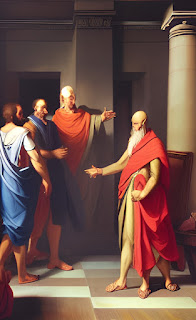Plato, John Locke, Thomas Paine
Plato, John Locke and Thomas Paine are three of the most influential philosophers in Western history. They each made significant contributions to the fields of political philosophy and the theory of government.
Plato was a Greek philosopher who lived from 427 to 347 BCE. He was a student of Socrates and the teacher of Aristotle. Plato's most famous work is "The Republic," in which he outlines his ideas on the nature of justice and the ideal form of government. He believed in the existence of an ideal, perfect world of Forms, which could only be apprehended through reason and philosophical contemplation.
John Locke was an English philosopher who lived from 1632 to 1704. He is considered one of the most influential thinkers of modern times and is often referred to as the "Father of Liberalism." Locke's most important work is "Two Treatises of Government," in which he argues for limited government, natural rights, and the idea that all men are equal. He believed that people have the right to life, liberty, and property, and that the purpose of government is to protect these rights.
Thomas Paine was an English philosopher who lived from 1737 to 1809. He was an influential figure during the American Revolution and is best known for his work "Common Sense," which advocated for independence from Britain. Paine was a strong supporter of the ideas of the Enlightenment and believed in the power of reason and individual rights. He argued for a form of government that would provide equality and justice for all people.
In conclusion, Plato, John Locke, and Thomas Paine each made important contributions to the fields of political philosophy and the theory of government. They continue to be studied and discussed today and their ideas continue to shape our understanding of government, justice, and individual rights.
Plato's ideas about government were heavily influenced by his belief in the existence of an ideal world of Forms. In "The Republic," he argues for a philosopher-kingship form of government, where the ruling class consists of philosopher-kings who have access to the world of Forms and are therefore able to govern justly. This form of government was intended to be an improvement over the existing democracies of ancient Greece, which Plato saw as corrupt and unjust.
Locke's political philosophy was based on the idea of natural rights and limited government. In "Two Treatises of Government," he argues that government must be based on the consent of the governed and that people have the right to rebel against a government that violates their natural rights. He believed that the role of government is to protect the life, liberty, and property of its citizens and that it must be limited in its power in order to prevent it from becoming tyrannical.
Paine was a strong advocate for individual rights and equality. In "Common Sense," he argued for American independence from Britain and for the establishment of a government that would provide equality and justice for all people. He believed that government should be based on the consent of the governed and that it must be limited in its power in order to prevent it from becoming oppressive. Paine's ideas were instrumental in the American Revolution and helped to shape the modern understanding of democracy and individual rights.
These three philosophers each had a unique perspective on the role of government and the relationship between the individual and the state. Plato believed in the philosopher-kingship form of government, while Locke believed in limited government and natural rights, and Paine believed in individual rights and equality. Despite their differences, they all had a common belief in the importance of justice and the protection of individual rights. Their ideas continue to influence political thought and shape the modern world.
Plato, John Locke, and Thomas Paine were each important figures in the development of Western political philosophy and the theory of government. They all had a deep commitment to the principles of justice and the protection of individual rights.
Plato's idea of a philosopher-kingship form of government was based on his belief in the existence of an ideal world of Forms and the need for a ruling class with access to that world in order to govern justly. Locke believed in limited government and the idea of natural rights, and argued that government must be based on the consent of the governed and must protect the life, liberty, and property of its citizens. Paine advocated for individual rights and equality, and believed in the importance of limiting government power to prevent it from becoming oppressive.
Despite their differences, these three philosophers all made important contributions to the fields of political philosophy and the theory of government. Their ideas continue to influence political thought and shape the modern world. The interlocking of their ideas shows that political philosophy is a dynamic field that evolves over time, as different thinkers build upon the ideas of their predecessors and develop new theories and perspectives.
In conclusion, Plato, John Locke, and Thomas Paine are three of the most influential philosophers in Western history. Their ideas continue to shape our understanding of government, justice, and individual rights, and their contributions to the field of political philosophy are immeasurable.


.jpg)


Comments
Post a Comment